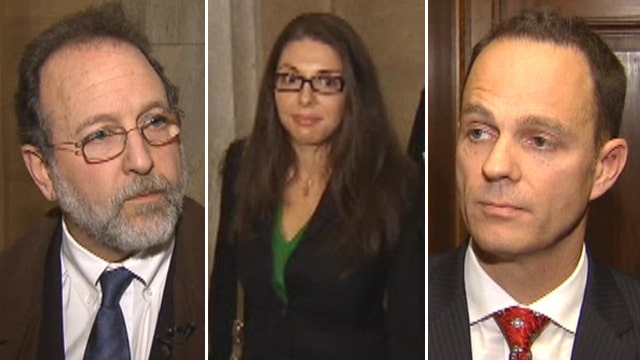Attorneys speak following Jana Winter's court hearing
Raw video: Reaction to New York State Court of Appeals hearing
New York's top court should stand up for the right of journalists to protect their sources and quash a subpoena ordering a FoxNews.com reporter to reveal who gave her information for a bombshell story following the Colorado movie massacre, a lawyer argued Tuesday.
The plea was made before the Court of Appeals on behalf of veteran reporter Jana Winter, who faces jail time if she takes the stand in Colorado and refuses to say who told her about a chilling notebook gunman James Holmes sent to his psychiatrist before the shooting in July, 2012.
"It is the essence of press freedom," Winter's attorney, Christopher Handman, said to FoxNews.com after the hearing. "It doesn't matter where the communication took place. New York's shield law is designed to protect New York journalists when they report on matters of public concern throughout the nation."
The panel is expected to hand down its ruling within a few weeks in the case, which has brought numerous statements of support for Winter from media organizations and First Amendment advocates.
If the New York court does not quash the Colorado subpoena, Winter must appear before Arapahoe County District Court Judge Carlos Samour Jr. on Jan. 3, and either reveal her sources or face an indeterminate jail term.
The panel pushed back against Handman's argument about location being irrelevant during the hearing, asking why New York should impose its powerful shield law on a case based in another state. Colorado's shield law protecting journalists has been characterized as flimsy by First Amendment experts.
"You want us to say that this journalist cannot be called to Colorado for work she did in the state?" asked Chief Judge Jonathan Lippman.
Hardman replied that, "the New York shield law is a categorical immunity."
“The record says nothing where this took place,” he added when asked by the court if Winter’s reporting took place within or outside of Colorado. “What matters in this is a New York journalist for a New York company."
Handman also said that the court should recognize the damage the subpoena is causing Winter's career as an investigative journalist. Winter has steadfastly protected her sources on the story, but says her sources have been hesitant to talk to her in light of the case.
An attorney representing Holmes' interests at the hearing countered Winter's argument.
“If this law applies to journalists then this means it applies to lawyers, priests, and doctors,” saidHolmes' attorney Daniel Arshack, “A priest would be sent to Colorado [to testify].”
The panel also pushed back on the rebuttal by Holmes' attorney.
"Doesn't it initiate shield law as it happened in New York state?" Judge Jenny Rivera asked. "Is it not for protecting the news gathering process?"
Arshack replied, "That's not her [Winter's] choice. She's litigating this exact issue in Colorado."
A lower New York court, at the request of Holmes’ defense team and with authorization from the Colorado court, issued a subpoena last January requiring Winter to appear in Colorado for the purpose of giving testimony. An appellate court ruled 3-2 against Winter, but the close decision automatically triggered her right to take the case to the Court of Appeals.
Holmes’ attorneys claim whoever spoke to Winter violated a gag order imposed on those involved in the investigation. But Winter’s defense team maintains the subpoena should have never been approved by the lower court in New York, where the shield law provides much more vigorous protection of journalists than a similar but weaker shield law in Colorado.
Former New York State Assemblyman Jerry Kremer, who helped draft the shield law in New York, told FoxNews.com,"The original intent of the shield law was to prevent these sorts of intrusions from happening. We intended to protect the press from having to reveal any sources."
Numerous media organizations and First Amendment advocates have issued statements and spoken on Winter’s behalf in the case. They argue the courts in both states have sent a chilling message to journalists, who need the protection of shield laws to do their jobs and keep the public informed. Without that protection, Winter’s supporters argue, journalists and whistleblowers are much less likely to reveal vital information in the public interest.
“The lower court [in New York] saw its role as extremely limited, regardless of defenses or First Amendment rights,” Peter Scheer, executive director of the First Amendment Center, told FoxNews.com. “The question is what should the court in New York have done? Should the subpoena even be enforced?”
Scheer and others have argued that Winter’s testimony is not needed for the central issue of guilt related to the Holmes case – a key requirement of the Colorado law that was applied to Winter. Holmes’ attorneys have admitted that he carried out the horrific attack.
“The fact is that it has to do with punishing [the source], but that is not important enough to outweigh the First Amendment,” said Scheer. “It’s really just to vindicate the authority of the Colorado court that imposed this gag order.”
Winter’s defense team has also argued that the lower court in New York failed to consider how the subpoena has hampered her ability to do her job. News of her court battle has prompted some long-time sources to refuse to speak to Winter, and she has lost numerous leads on various news stories—harm that her lawyers said the New York Shield Law was designed to prevent.










































